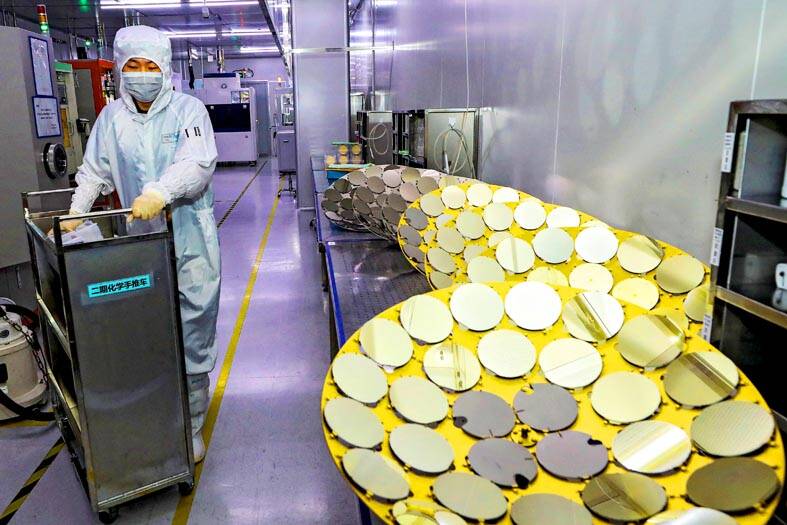Chinese imports of equipment to make semiconductors hit a record for the first seven months of this year as its companies continue to ramp up purchases in case the US and its allies further block them from buying.
Chinese firms imported almost US$26 billion of chipmaking machinery, fresh trade data released by the Chinese General Administration of Customs this week showed.
That surpassed the previous high mark in 2021 and comes as US, Japanese and Dutch officials work on increasing restrictions on Chinese companies.

Photo: AFP
Chinese purchases from firms such as Tokyo Electron Ltd, ASML Holding NV and Applied Materials Inc have soared in the past year.
During the period, Chinese companies bought more lower-end equipment after the US and its allies tightened controls on their access to the most cutting-edge technology.
That spending spree has helped drive Dutch exports to China to new highs, exceeding US$2 billion last month for only the second time on record.
Dutch company ASML’s sales to China surged 21 percent year-on-year in the second quarter to hit almost half of its total revenue, with sales consisting of unrestricted older systems as Beijing pushes to make more mature types of semiconductors.
ASML is the sole supplier of the most advanced lithography equipment required to make cutting-edge chips. China’s Semiconductor Manufacturing International Corp (中芯) relied on ASML’s older generation of lithography machines to achieve a technological breakthrough last year, Bloomberg News has reported.
Chinese chipmakers are expected to grow their output by 14 percent to 10.1 million wafers per month next year, or nearly a third of the global industry’s production, after achieving a 15 percent increase this year, trade group SEMI estimated in June.
The US has been tightening rules that would restrict China’s progress in critical technologies including semiconductors and artificial intelligence.
Those measures include repeated rounds of export controls limiting the sale of advanced chips and equipment capable of making those components.
Separately, one of China’s most prominent chip gear makers is suing the Pentagon for linking it to the Chinese People’s Liberation Army, seeking to get off a blacklist that bars business with US firms.
Advanced Micro-Fabrication Equipment Inc (中微半導體) alleged that the US defense agency harmed the company’s business and reputation by adding the Shanghai entity to the so-called Section 1260H list of firms linked to China’s military, the company said in its lawsuit.
The Chinese company competes with top US firms including Applied Materials and Lam Research Corp.
In its latest annual report, the Chinese company said some of its machines are now being used to make chips as advanced as 5-nanometers, or technology only one generation behind the most cutting-edge.

Real estate agent and property developer JSL Construction & Development Co (愛山林) led the average compensation rankings among companies listed on the Taiwan Stock Exchange (TWSE) last year, while contract chipmaker Taiwan Semiconductor Manufacturing Co (TSMC, 台積電) finished 14th. JSL Construction paid its employees total average compensation of NT$4.78 million (US$159,701), down 13.5 percent from a year earlier, but still ahead of the most profitable listed tech giants, including TSMC, TWSE data showed. Last year, the average compensation (which includes salary, overtime, bonuses and allowances) paid by TSMC rose 21.6 percent to reach about NT$3.33 million, lifting its ranking by 10 notches

SEASONAL WEAKNESS: The combined revenue of the top 10 foundries fell 5.4%, but rush orders and China’s subsidies partially offset slowing demand Taiwan Semiconductor Manufacturing Co (TSMC, 台積電) further solidified its dominance in the global wafer foundry business in the first quarter of this year, remaining far ahead of its closest rival, Samsung Electronics Co, TrendForce Corp (集邦科技) said yesterday. TSMC posted US$25.52 billion in sales in the January-to-March period, down 5 percent from the previous quarter, but its market share rose from 67.1 percent the previous quarter to 67.6 percent, TrendForce said in a report. While smartphone-related wafer shipments declined in the first quarter due to seasonal factors, solid demand for artificial intelligence (AI) and high-performance computing (HPC) devices and urgent TV-related orders

Prices of gasoline and diesel products at domestic fuel stations are this week to rise NT$0.2 and NT$0.3 per liter respectively, after international crude oil prices increased last week, CPC Corp, Taiwan (台灣中油) and Formosa Petrochemical Corp (台塑石化) said yesterday. International crude oil prices last week snapped a two-week losing streak as the geopolitical situation between Russia and Ukraine turned increasingly tense, CPC said in a statement. News that some oil production facilities in Alberta, Canada, were shut down due to wildfires and that US-Iran nuclear talks made no progress also helped push oil prices to a significant weekly gain, Formosa said

MINERAL DIPLOMACY: The Chinese commerce ministry said it approved applications for the export of rare earths in a move that could help ease US-China trade tensions Chinese Vice Premier He Lifeng (何立峰) is today to meet a US delegation for talks in the UK, Beijing announced on Saturday amid a fragile truce in the trade dispute between the two powers. He is to visit the UK from yesterday to Friday at the invitation of the British government, the Chinese Ministry of Foreign Affairs said in a statement. He and US representatives are to cochair the first meeting of the US-China economic and trade consultation mechanism, it said. US President Donald Trump on Friday announced that a new round of trade talks with China would start in London beginning today,